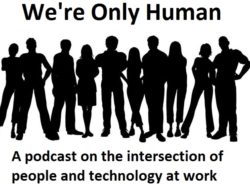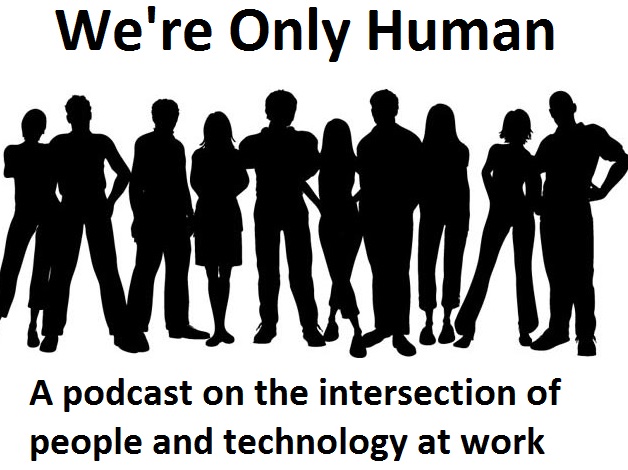Subscribers click here to listen and check out the show
I’m just a little bit excited today. I am part of a set of new hosts joining the HR Happy Hour Podcast Network with a new show, We’re Only Human. It’s a play on words and gives multiple meanings, because for starters, despite the pressure on us as HR leaders, we’re still only human. It also gives me a chance to talk about how, despite automation and other factors, we need to be looking at our people as human beings with needs and desires, not simply data points or engagement scores.
I start off the show by telling a story of how I inadvertently insulted my wonderful wife while she was in labor with our son a few years ago. Yes, and I’m still alive today to tell about it. Definitely check out the show and have a laugh at my expense!
Show Notes
*Note, since this was the introductory episode I included pretty much the entire transcript below. For future episodes the show notes will be a condensed version with highlights, links, etc. Thanks!
Gallup data from summer 2016 says that just under a third of employees are engaged. I’m seeing an increasing focus on this concept of the employee experience. Candidate experience. Customer experience. The natural extension of those elements is the employee experience. This isn’t just about employee engagement or the employer value proposition. It’s a broader look at the collective experiences people have in the workplace. From how their manager coaches them (or not) to how people interact with technology in the workplace, the employee experience is something that is becoming more of an issue for many employers.
Experiences are what separate good employers from great ones. For instance:
- When new hires start at the company they sit down and listen to an hour of policy edicts and rules telling them everything they can’t do. OR when new hires start they join with the other newbies to act out policy requirements to help cement the ideas while building social connections with their peers.
- Learning time! The employee clicks into the LMS only to click again, and again, and again. 47 clicks later she is able to access the training she was looking for. OR the employee opens up the LMS and it knows what she is looking for based on previous training, search activity, and other factors, bringing the content directly to her so she can skip searching and start learning.
- Whee! Open enrollment is here. The employee waits to receive a boatload of documentation from HR about what options are available and how much they are going to cost before hiring a translator to help them understand what everything means. OR the employee receives a video before open enrollment begins offering insights into new choices and options for coverage including high level overviews of costs. When it’s time for open enrollment, the employee already knows what he wants to elect and can take care of it within his own self service dashboard.
- Performance management month drives managers and employees crazy. Managers save up their “ammunition” for the one true performance conversation they have each year and employees save emails and prepare contingencies and excuses to avoid any nasty surprises. OR managers meet with employees on a regular basis, offering feedback around good and bad performance. At the end of the year, a summary of the recurring conversations is prepared and each party signs off on the summarized version of the entire year’s performance discussions. No surprises.
These are simple, experience-driven changes that can help to retain employees and demonstrate to them that they are valued. And, just in case you didn’t notice, two of these options are tied to technology and two are not. I know that there are plenty of companies that just don’t have the technology on hand or the budget to acquire it. At the same time, there are many technology options across the spectrum, from companies looking for low-cost support that can give them increased capabilities without the major budget line item to those with money to spend who are ready to find the right tool or technology to give them the edge over the competition.
With that in mind, I want to talk a bit about the new show and what you can expect.
The broad focus of the show will be on the changing nature of work and how technology impacts that. Over my working life I have seen an incredible number of changes in how we work, and I think that is an incredible trend that HR leaders need to be plugged into. Not only are we more flexible than ever, we also have a bigger focus on mobile, social, and collaborative work. We have technology that knows us almost as well as we know ourselves. We have this dynamic pull between a technology-enabled workplace and a desire to be more targeted toward a personalized, individual approach. I think that’s fascinating and want to focus on it more. In the coming months there will be interviews with practitioners, discussions with vendors, and other episodes to bring you the information you need to be at the top of your HR game.
If you have listened to the HR Happy Hour show for a while you probably caught me with my nerdiness in full swing. I do a lot of reading and book reviews and Steve occasionally would have a review on the show. I’ve known Steve and Trish for a long time and still remember the first ever episode of HR Happy Hour way back when.  With the new shows on the network from Madeline, Mollie, and George, this is an exciting time for all of us at HR Happy Hour HQ.
Other episodes will feature interviews with practitioners, discussions with vendors and other content, but I know that this first episode is the obligatory “about me” conversation to introduce me to the world. Hopefully this helps to show you where I’m coming from and what you can expect from the show.
I live and work in Huntsville, Alabama. My career so far: lighthouse, BHG, practitioner. upstartHR, Part time consulting locally to stay plugged into the HR practitioner point of view. HRevolution.. Volunteer on my local SHRM board, which I think is important for helping to connect with and drive grassroots change within the profession. I’m certified and have my SPHR and SHRM-SCP. I love reading, writing, running, and spending time with my kids. Baby on the way.
As you can see, when I’m not making dumb comments to my wife, I’m doing a wide variety of things that I think make me a better HR pro and analyst. I wrote a piece recently called “why we need to break HR.” You can find it at upstartHR.com In it I explored one of my earliest interactions in the HR space with someone that told me that I would soon be another dead-eyed zombie shuffling HR paperwork. I vowed never to follow that path, and to this day I have never given in to the dark side. Chances are if you’re listening to this, you are one of those people that still holds out hope that this HR thing can bring value to our organizations and help people.
To get an idea of what I believe in, you need to check out the last few things I’ve published. They have titles like How to Analyze Source of Hire Data to Validate Recruiting Efforts, It’s Time to Break HR, How to Win Friends and Influence People: HR Edition
I think we have more of a chance than ever to bring some true value with the work we do within the HR field, especially with the increasingly fluid nature of work and how things get done. So, with that out of the way, I hope you join me for further discussion in future episodes and also check out the other shows on the network to get a better overall picture of this industry and how it is evolving. Thanks for listening and I’ll catch you next time.
 The 2016 HR Technology Conference had a new feature: the Women in HR Tech Summit. The event was a success by all measures, but one person heard about the summit and started to wonder, what do female executives in HR technology do differently? What makes them successful? What lessons can we translate to the HR community at large, helping women to achieve greater success in their roles as executives, HR leaders, and business professionals?
The 2016 HR Technology Conference had a new feature: the Women in HR Tech Summit. The event was a success by all measures, but one person heard about the summit and started to wonder, what do female executives in HR technology do differently? What makes them successful? What lessons can we translate to the HR community at large, helping women to achieve greater success in their roles as executives, HR leaders, and business professionals? The idea of a “gig” isn’t anything new, but the concept of using gig workers as an alternative source of talent certainly is. More companies are starting to realize that getting a job done doesn’t always have to mean creating a requisition, posting a job, interviewing candidates, and making an offer. In the case of some new applications on the market, companies can bring talent to their front door at the veritable push of a button. Yes, really.
The idea of a “gig” isn’t anything new, but the concept of using gig workers as an alternative source of talent certainly is. More companies are starting to realize that getting a job done doesn’t always have to mean creating a requisition, posting a job, interviewing candidates, and making an offer. In the case of some new applications on the market, companies can bring talent to their front door at the veritable push of a button. Yes, really.